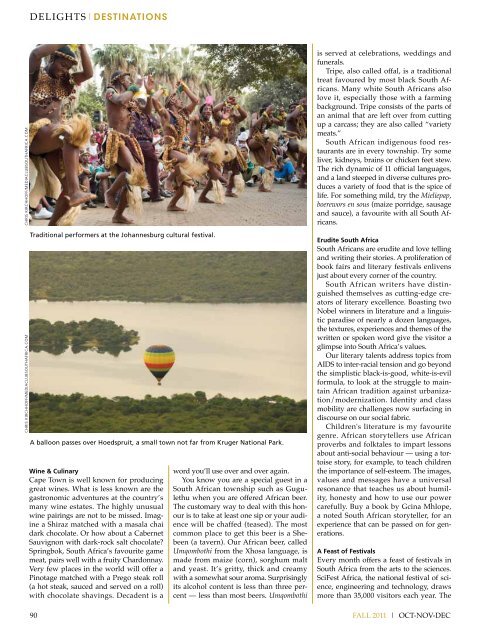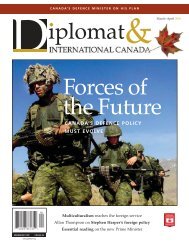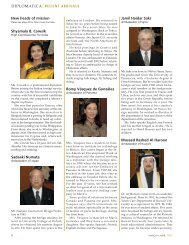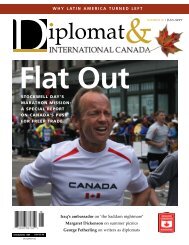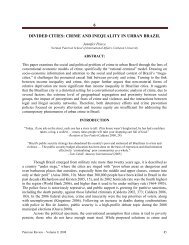the new petro power paradigm - Diplomat Magazine
the new petro power paradigm - Diplomat Magazine
the new petro power paradigm - Diplomat Magazine
You also want an ePaper? Increase the reach of your titles
YUMPU automatically turns print PDFs into web optimized ePapers that Google loves.
DELIGHTS|destinations<br />
Chris Kirchhoff/MediaClubSouthAfrica.com<br />
Chris Kirchhoff/MediaClubSouthAfrica.com<br />
Traditional performers at <strong>the</strong> Johannesburg cultural festival.<br />
A balloon passes over Hoedspruit, a small town not far from Kruger National Park.<br />
Wine & Culinary<br />
Cape Town is well known for producing<br />
great wines. What is less known are <strong>the</strong><br />
gastronomic adventures at <strong>the</strong> country’s<br />
many wine estates. The highly unusual<br />
wine pairings are not to be missed. Imagine<br />
a Shiraz matched with a masala chai<br />
dark chocolate. Or how about a Cabernet<br />
Sauvignon with dark-rock salt chocolate?<br />
Springbok, South Africa’s favourite game<br />
meat, pairs well with a fruity Chardonnay.<br />
Very few places in <strong>the</strong> world will offer a<br />
Pinotage matched with a Prego steak roll<br />
(a hot steak, sauced and served on a roll)<br />
with chocolate shavings. Decadent is a<br />
90<br />
word you’ll use over and over again.<br />
You know you are a special guest in a<br />
South African township such as Gugulethu<br />
when you are offered African beer.<br />
The customary way to deal with this honour<br />
is to take at least one sip or your audience<br />
will be chaffed (teased). The most<br />
common place to get this beer is a Shebeen<br />
(a tavern). Our African beer, called<br />
Umqombothi from <strong>the</strong> Xhosa language, is<br />
made from maize (corn), sorghum malt<br />
and yeast. It’s gritty, thick and creamy<br />
with a somewhat sour aroma. Surprisingly<br />
its alcohol content is less than three percent<br />
— less than most beers. Umqombothi<br />
is served at celebrations, weddings and<br />
funerals.<br />
Tripe, also called offal, is a traditional<br />
treat favoured by most black South Africans.<br />
Many white South Africans also<br />
love it, especially those with a farming<br />
background. Tripe consists of <strong>the</strong> parts of<br />
an animal that are left over from cutting<br />
up a carcass; <strong>the</strong>y are also called “variety<br />
meats.”<br />
South African indigenous food restaurants<br />
are in every township. Try some<br />
liver, kidneys, brains or chicken feet stew.<br />
The rich dynamic of 11 official languages,<br />
and a land steeped in diverse cultures produces<br />
a variety of food that is <strong>the</strong> spice of<br />
life. For something mild, try <strong>the</strong> Mieliepap,<br />
boerewors en sous (maize porridge, sausage<br />
and sauce), a favourite with all South Africans.<br />
Erudite South Africa<br />
South Africans are erudite and love telling<br />
and writing <strong>the</strong>ir stories. A proliferation of<br />
book fairs and literary festivals enlivens<br />
just about every corner of <strong>the</strong> country.<br />
South African writers have distinguished<br />
<strong>the</strong>mselves as cutting-edge creators<br />
of literary excellence. Boasting two<br />
Nobel winners in literature and a linguistic<br />
paradise of nearly a dozen languages,<br />
<strong>the</strong> textures, experiences and <strong>the</strong>mes of <strong>the</strong><br />
written or spoken word give <strong>the</strong> visitor a<br />
glimpse into South Africa’s values.<br />
Our literary talents address topics from<br />
AIDS to inter-racial tension and go beyond<br />
<strong>the</strong> simplistic black-is-good, white-is-evil<br />
formula, to look at <strong>the</strong> struggle to maintain<br />
African tradition against urbanization/modernization.<br />
Identity and class<br />
mobility are challenges now surfacing in<br />
discourse on our social fabric.<br />
Children's literature is my favourite<br />
genre. African storytellers use African<br />
proverbs and folktales to impart lessons<br />
about anti-social behaviour — using a tortoise<br />
story, for example, to teach children<br />
<strong>the</strong> importance of self-esteem. The images,<br />
values and messages have a universal<br />
resonance that teaches us about humility,<br />
honesty and how to use our <strong>power</strong><br />
carefully. Buy a book by Gcina Mhlope,<br />
a noted South African storyteller, for an<br />
experience that can be passed on for generations.<br />
A Feast of Festivals<br />
Every month offers a feast of festivals in<br />
South Africa from <strong>the</strong> arts to <strong>the</strong> sciences.<br />
SciFest Africa, <strong>the</strong> national festival of science,<br />
engineering and technology, draws<br />
more than 35,000 visitors each year. The<br />
FALL 2011 | OCT-NOV-DEC


